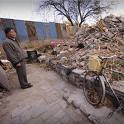This is an older article, but it is good because it shows an overall positive movement by the Chinese people. I know it might seem that I am always frustrated that the people in China don’t solve the problems of human rights, but maybe they are and I just am not seeing it reported…
 Sociologist Ching Kwan Lee, a sociologist at the University of California-Los Angeles, writes in the summer issue of the American Sociological Association’s Contexts magazine that there is a ‘quiet revolution’ happening among citizens of China that isn’t recognized by the louder human rights activists.
Sociologist Ching Kwan Lee, a sociologist at the University of California-Los Angeles, writes in the summer issue of the American Sociological Association’s Contexts magazine that there is a ‘quiet revolution’ happening among citizens of China that isn’t recognized by the louder human rights activists.
In the case of labor rights, despite a series of labor laws passed since the  1990s, Lee asserts that labor standards in China have remained extremely bad since the country’s economic reform began 30 years ago. As a result, non-governmental organizations have formed to provide legal and other services; the legal profession has ballooned; and workers are protesting through civil disobedience and other strategies.
1990s, Lee asserts that labor standards in China have remained extremely bad since the country’s economic reform began 30 years ago. As a result, non-governmental organizations have formed to provide legal and other services; the legal profession has ballooned; and workers are protesting through civil disobedience and other strategies.
Property ownership is another area in which local governments violate  citizen rights in pursuit of financial gains from land lease sales and urban redevelopment. Homeowner activism has included petitions, mass occupations of property management company offices, development and use of neighborhood Web sites, hunger strikes and other strategies. In addition, homeowners’ associations are increasingly being formed to advocate for rights and prevent power abuses by the local government.
citizen rights in pursuit of financial gains from land lease sales and urban redevelopment. Homeowner activism has included petitions, mass occupations of property management company offices, development and use of neighborhood Web sites, hunger strikes and other strategies. In addition, homeowners’ associations are increasingly being formed to advocate for rights and prevent power abuses by the local government.
In the area of land rights, thousands of conflicts, some violent, arise every  year in China due to illegal land grabs by local officials, withholding of farmer compensation and lack of job replacement for those whose land has been taken. An estimated 34 million farmers have lost some or all of their land over the past two decades. Rural Chinese citizens are reacting to these rights violations by issuing public statements, filing lawsuits and organizing collective protests.
year in China due to illegal land grabs by local officials, withholding of farmer compensation and lack of job replacement for those whose land has been taken. An estimated 34 million farmers have lost some or all of their land over the past two decades. Rural Chinese citizens are reacting to these rights violations by issuing public statements, filing lawsuits and organizing collective protests.
“Today’s rights activism in China provides a look at the forces driving the near-total transformation of the most populace nation in the world,” Lee said. “Attention may shift away from China after the 2008 Olympic Games conclude, yet the struggles between economic growth and social stability; between authoritarian rule and a more responsive state and involved citizenry; and between local and central governments will continue to shape and define China for the long-term future.”
Leave a comment